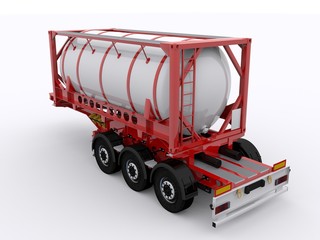IOSH forums home
»
Our public forums
»
OSH discussion forum
»
Fall Hazard when connecting and disconnecting hoses to bottom discharge ISO tankers
Rank: New forum user 
|
Dear Experts, I need your opinion around the fall protection requirements when connecting and disconnecting hoses from a bottom discharge ISO tanks on the skelly. (Please note this is not related to getting onto the top of the tank) The drivers of these tankers have to get at the back of the cab to connect the air line and other connections whilst the operators have to get on back of the tanker skelly (few feet above the ground in both cases) to connect the hoses. Is it okay to get on and off to do this and this we what I see commonly across the industry. I am after the practices around doing these activites. Is there a HSE requirement that mandates the fall protection for these activites? According to OSHA, work at hight is considered to be a work that is 1.2m high from the lowest level, however, in UK, any work is essentially WAH. So why dont we see a fall protection on these as there is a potential fall or the sides and also backwards. 

Edited by user 28 November 2024 15:52:55(UTC)
| Reason: Not specified
|
|
|
|
|
|
Rank: Super forum user 
|
It's a good question. The reason fall protection isn't usually provided in this case is that it's quite difficult to do - not that there isn't a risk, or that you shouldn't try to do it. (Note - I do not mean fall arrest systems, as they don't work at such a low height. I mean some kind of barrier to prevent a fall.)
Some years ago the HSE ran a campaign on falls from vehicles and published a lot of materials on the topic including some detailed case studies and guidance. This was mainly but not exclusively about falling from the tops of vehicles, and they did include some materials about falling from the lower parts of vehicles. This would have been in around 2008.
I see on their current guidance page on the topic of falls from vehicles (which has been substantially dumbed down since that campaign) there is a link to an archive. It looks like this goes to the original campaign materials and might have something relevant for you.
Topic link:
https://www.hse.gov.uk/workplacetransport/information/falls.htm
Archive link:
https://webarchive.nationalarchives.gov.uk/ukgwa/20200806161500/https://www.hse.gov.uk/fallsfromvehicles/index.htm
|
 2 users thanked Kate for this useful post.
|
|
|
|
Rank: Super forum user 
|
Thee question of cab connections applies to a driver connecting to any form of trailer so not only ISO tanks. Invariably it is such a short duration task that applying fall protection would be a disproportionate control. Regarding your operator question the blue painted image actually shows a step platform and grab handles integrated in to the trailer design
|
|
|
|
|
|
Rank: Super forum user 
|
Thee question of cab connections applies to a driver connecting to any form of trailer so not only ISO tanks. Invariably it is such a short duration task that applying fall protection would be a disproportionate control. Regarding your operator question the blue painted image actually shows a step platform and grab handles integrated in to the trailer design
|
|
|
|
|
|
Rank: Super forum user 
|
Hi saquibmd Like OSHA, the UK used to have an arbitrary height from which someone might fall before legislation kicked in. That was generally set at 6 feet 6 inches, amended to metricate to 2 metres. The exception was any kind of ladder there this threshold didn't apply. However, as you indicate the WAH Regs did away with any threshold, BUT requires doing what is reasonably practicable. As Roundtuit indicates the short duration of the tasks to be performed is one of the factors to be considered when working out what might be reasonably practicable or NOT. However, there are many other factors to take into account. As example, if you have the same operation being perfomed in the same place on lots of similar trailers, then perhaps a working platform would be reasonably practicable when it wouldn't be for a one off operation.
|
|
|
|
|
|
IOSH forums home
»
Our public forums
»
OSH discussion forum
»
Fall Hazard when connecting and disconnecting hoses to bottom discharge ISO tankers
You cannot post new topics in this forum.
You cannot reply to topics in this forum.
You cannot delete your posts in this forum.
You cannot edit your posts in this forum.
You cannot create polls in this forum.
You cannot vote in polls in this forum.